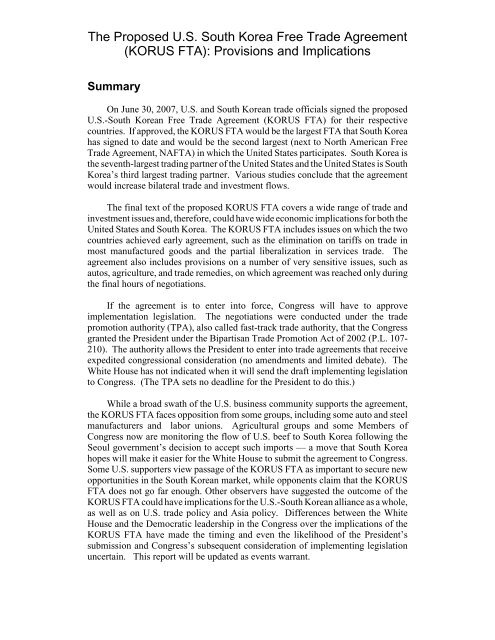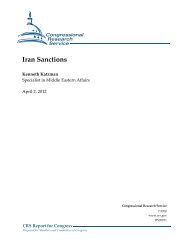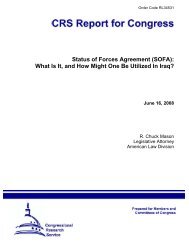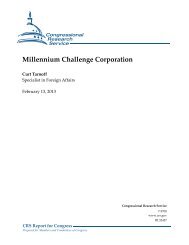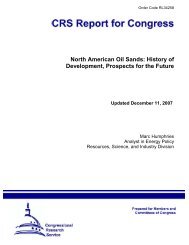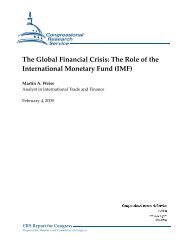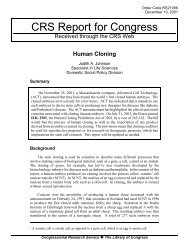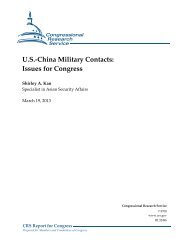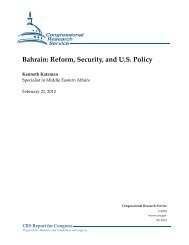The Proposed U.S.-South Korea Free Trade Agreement (KORUS ...
The Proposed U.S.-South Korea Free Trade Agreement (KORUS ...
The Proposed U.S.-South Korea Free Trade Agreement (KORUS ...
- TAGS
- korea
- fpc.state.gov
Create successful ePaper yourself
Turn your PDF publications into a flip-book with our unique Google optimized e-Paper software.
<strong>The</strong> <strong>Proposed</strong> U.S. <strong>South</strong> <strong>Korea</strong> <strong>Free</strong> <strong>Trade</strong> <strong>Agreement</strong><br />
(<strong>KORUS</strong> FTA): Provisions and Implications<br />
Summary<br />
On June 30, 2007, U.S. and <strong>South</strong> <strong>Korea</strong>n trade officials signed the proposed<br />
U.S.-<strong>South</strong> <strong>Korea</strong>n <strong>Free</strong> <strong>Trade</strong> <strong>Agreement</strong> (<strong>KORUS</strong> FTA) for their respective<br />
countries. If approved, the <strong>KORUS</strong> FTA would be the largest FTA that <strong>South</strong> <strong>Korea</strong><br />
has signed to date and would be the second largest (next to North American <strong>Free</strong><br />
<strong>Trade</strong> <strong>Agreement</strong>, NAFTA) in which the United States participates. <strong>South</strong> <strong>Korea</strong> is<br />
the seventh-largest trading partner of the United States and the United States is <strong>South</strong><br />
<strong>Korea</strong>’s third largest trading partner. Various studies conclude that the agreement<br />
would increase bilateral trade and investment flows.<br />
<strong>The</strong> final text of the proposed <strong>KORUS</strong> FTA covers a wide range of trade and<br />
investment issues and, therefore, could have wide economic implications for both the<br />
United States and <strong>South</strong> <strong>Korea</strong>. <strong>The</strong> <strong>KORUS</strong> FTA includes issues on which the two<br />
countries achieved early agreement, such as the elimination on tariffs on trade in<br />
most manufactured goods and the partial liberalization in services trade. <strong>The</strong><br />
agreement also includes provisions on a number of very sensitive issues, such as<br />
autos, agriculture, and trade remedies, on which agreement was reached only during<br />
the final hours of negotiations.<br />
If the agreement is to enter into force, Congress will have to approve<br />
implementation legislation. <strong>The</strong> negotiations were conducted under the trade<br />
promotion authority (TPA), also called fast-track trade authority, that the Congress<br />
granted the President under the Bipartisan <strong>Trade</strong> Promotion Act of 2002 (P.L. 107-<br />
210). <strong>The</strong> authority allows the President to enter into trade agreements that receive<br />
expedited congressional consideration (no amendments and limited debate). <strong>The</strong><br />
White House has not indicated when it will send the draft implementing legislation<br />
to Congress. (<strong>The</strong> TPA sets no deadline for the President to do this.)<br />
While a broad swath of the U.S. business community supports the agreement,<br />
the <strong>KORUS</strong> FTA faces opposition from some groups, including some auto and steel<br />
manufacturers and labor unions. Agricultural groups and some Members of<br />
Congress now are monitoring the flow of U.S. beef to <strong>South</strong> <strong>Korea</strong> following the<br />
Seoul government’s decision to accept such imports — a move that <strong>South</strong> <strong>Korea</strong><br />
hopes will make it easier for the White House to submit the agreement to Congress.<br />
Some U.S. supporters view passage of the <strong>KORUS</strong> FTA as important to secure new<br />
opportunities in the <strong>South</strong> <strong>Korea</strong>n market, while opponents claim that the <strong>KORUS</strong><br />
FTA does not go far enough. Other observers have suggested the outcome of the<br />
<strong>KORUS</strong> FTA could have implications for the U.S.-<strong>South</strong> <strong>Korea</strong>n alliance as a whole,<br />
as well as on U.S. trade policy and Asia policy. Differences between the White<br />
House and the Democratic leadership in the Congress over the implications of the<br />
<strong>KORUS</strong> FTA have made the timing and even the likelihood of the President’s<br />
submission and Congress’s subsequent consideration of implementing legislation<br />
uncertain. This report will be updated as events warrant.


